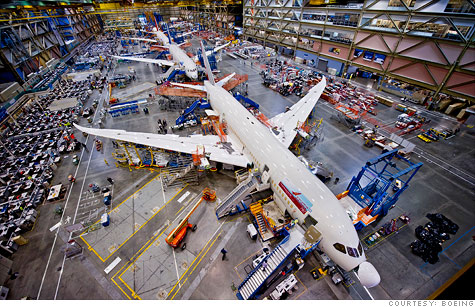Search News

The Boeing 787 Dreamliner assembly line outside of Seattle. The NLRB wants to block Boeing from shifting work from this line to a new non-union plant in South Carolina.
NEW YORK (CNNMoney) -- There's a new battle brewing between big business and labor.
A factory in South Carolina could soon be home to 1,000 new workers assembling Boeing's newest commercial jet. But as it prepares for the first jet to roll off the line this summer, Boeing must first go head to head with the National Labor Relations Board.
And the factory has also become ground zero for a political debate between Democrats and Republicans on how to create jobs.
It all began last month, when the NLRB filed a complaint, charging that Boeing broke the law when it decided to shift some production of its new 787 "Dreamliner" jet to the new factory in South Carolina from its union-represented plant in Washington State.
The NLRB claims that Boeing's intent was to punish the International Association of Machinists for the union's past strikes.
"A worker's right to strike is a fundamental right," said NLRB Acting General Counsel Lafe Solomon when he issued the complaint. "We also recognize the rights of employers to make business decisions based on their economic interests, but they must do so within the law."
Boeing (BA, Fortune 500) moved to open the new factory after failing to win a non-strike promise from the IAM union, which most recently struck against Boeing for 58 days in 2008.
Company executives cited the need to insure production of the Dreamliner as one reason for building the new line in South Carolina, which is a right-to-work state -- meaning workers can choose whether or not they want to be unionized.
The NLRB says it's not trying to prevent Boeing from opening the plant altogether. It just doesn't want Boeing to shift work away from the union-represented workers in Washington.
"Once that plant is up and running, our members in Puget Sound will be saying, 'That's what happens if we strike, if we negotiate hard at the bargaining table, they take our work away,'" said Chris Corson, general counsel of the International Association of Machinists.
But Boeing insists that the 23,000 Machinist union members in Washington will not lose work to the South Carolina plant, which will build three of the ten 787 jets now being built each month. Workers in Washington will instead be put to work on other aircraft.
But the Dreamliner is simply too important to risk interruptions from union disputes, said company spokesman Tim Neale.
"They're starting to give us a reputation as an unreliable supplier," said Neale of the union. "We pay penalties to the customers when we're late delivering the planes." Boeing estimates the last strike cost it $1.8 billion.
And even if some of the Dreamliner production is shifted to South Carolina, hourly employment at the Washington plant is still on the rise, said Neale.
"We're in a hiring mode across the board," he said.
Starting pay at the South Carolina plant will be about $14 an hour compared to $15 an hour at the Washington plant, according to the IAM. A veteran worker at that plant earns about $27 an hour, or about $56,000 a year before overtime.
The case will go before an administrative law judge next month, likely followed by a decision by the full NLRB. Boeing and the IAM both vow that they will appeal the case to Federal Court if they loses before the bipartisan board.
Republicans have seized on the dispute as proof that the Obama administration is to blame for businesses not creating more jobs.
"The Boeing story illustrates this administration's focus on favoring unions at the cost of creating the kind of middle-class jobs we all want," said Sen. Michael Enzi, the lead Republican on a Senate labor panel hearing that focused on the case last week.
Congressional Republicans have tried to slash the funding of the NLRB and demanded that the acting general counsel who brought the case be fired.
Boeing CEO Jim McNerney, who chairs the president's export council, said the case against his company is a "fundamental assault on capitalist principles."
Though the Obama administration has remained quiet on the case, other Democrats have hit back, accusing the Republicans of distorting the facts of the case.
"If we let powerful CEOs trample all over these rights without consequences, we might as well give up on having a middle class altogether," said Sen. Tom Harkin, the Democratic chairman of the senate's labor panel.
"What we are really witnessing here is another example of the Republican assault on the middle class that has been echoing across the country for months now," Harkin said.
While both Boeing and the Machinist union express confidence they will prevail in the ultimate legal battle, the Machinists' Corson said he is concerned that the union could win the legal fight and lose the public relations war.
"Boeing is so far pretty successfully using this case to throw some red meat at the larger debate in this country about labor and capitalism," he said. "I think our message is getting out, but I don't think we have as much money and connections as Boeing does." ![]()